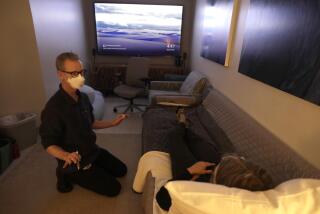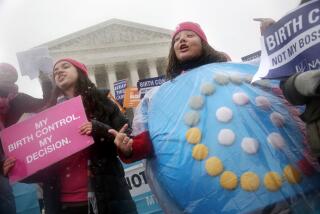FDA Panel Votes Implant Limits : Health: Advisory group rejects an outright ban. Recommendation would restrict cosmetic use of the silicone gel devices, but allow for reconstructive surgery.
- Share via
WASHINGTON — A federal advisory panel Thursday recommended significant restrictions on silicone gel breast implants for cosmetic reasons but urged that they be allowed for reconstructive surgery.
The panel voted to reject an outright ban on the implants.
The recommendation by the Food and Drug Administration panel reflected an effort to reconcile concerns about the potential dangers of silicone with feelings that some women--particularly those who have had mastectomies--have a compelling psychological need for the implants.
Under the recommendation, women seeking the controversial devices for cosmetic reasons--usually breast enlargement--would have limited access only as part of carefully controlled scientific studies.
The panel said, however, that all women who need the implants for reconstructive surgery should have them, although they too would become part of a research program. These women would include breast cancer patients, women with congenital breast abnormalities and those who have suffered some kind of trauma that deformed the breast.
In making its recommendation, the panel said there was not enough scientific evidence to establish a cause-and-effect relationship between silicone and autoimmune diseases.
This proposal “responds to science on the one hand and compassion on the other,” said medical ethicist Nancy Dubler, a member of the panel.
The recommendation must still be approved by the full FDA, although it rarely overrules an advisory committee. FDA Commissioner David A. Kessler has promised to announce a final decision within 60 days. Until then, a voluntary moratorium on the use of the devices, requested by Kessler on Jan. 6, is expected to remain in place.
For nearly a year, the implants have been the focus of a painful and emotional national debate that has pitted woman against woman and raised soul-searching questions about the values of a breast-conscious society.
Many women have argued that the implants made a profound difference in their lives, especially for reconstruction after breast cancer, while others have blamed the devices as the source of debilitating conditions that caused enormous suffering.
If the proposal is approved by the FDA, it would mean that the devices would no longer be available on the general market. Women who receive silicone gel implants would become participants in a large research program monitored by the federal government.
“This is wonderful for those women who will have access, but I am disappointed for those women who may be denied it in the future,” said J. Kermit Campbell, group vice president for Dow Corning Corp., the leading manufacturer of the devices. “We hope it will not be so restrictive that women who truly have a need will not be able to get it.”
However, Dow Corning said it might stop making the implants. Robert T. Rylee, chairman of Dow Corning’s health care businesses, said the company would decide “fairly soon” whether to sell its breast implant business.
Dr. Norman Cole, president of the American Society for Plastic and Reconstructive Surgery, said he believed the FDA plan would make it difficult for women seeking breast augmentation, since they “will need to make a significant investment of time and effort to be part of the (study) group.”
Nevertheless, “they haven’t taken gel implants away,” he added. “These studies will allow us to prove exactly what we have felt all along--that they are safe.”
But Dr. Sidney Wolfe, director of the Public Citizen Health Research Group, said he hoped the FDA would decide to remove the devices from circulation.
“Silicone gel is too dangerous to put in humans--period,” he said.
Although the plan would mean greater access for reconstruction patients, it was unclear how many women it would affect. Eighty percent of women who now seek implants do so for cosmetic reasons, the rest for reconstruction.
The panel also did not indicate how many women would be included in the scientific studies, although its members indicated that thousands would be needed to resolve critical scientific questions about the safety of the devices.
Among other things, the research would have to address the health consequences of an implant rupture and of slow leakage, or “gel bleed,” over time through the envelope surrounding the implant. Members of the panel expressed significant reservations about the potential health impact of both rupture and bleed.
Silicone has been tentatively linked to the development of autoimmune diseases, including certain connective tissue disorders, and cancer, although the panel concluded that the science was inadequate to establish a direct cause-and-effect relationship.
The panel was deeply divided over the level of risk, and over how widespread the availability of the devices should be. Several non-voting members of the committee also argued that no line should be drawn between augmentation and reconstruction.
“This is judgmental and paternalistic,” said Dr. Mary H. McGrath, professor of plastic surgery at George Washington University. “It’s ruling on the validity of cosmetic surgery--and I don’t think that’s our business.”
But most of the voting members insisted that the relationship between risks and benefits was significantly different for augmentation and reconstruction--a reversal of the position the panel took last fall.
At that time, “I believed we should deal with women’s needs as a single constituency, but I have since come to reconsider that,” said Rita Freedman, a clinical psychologist from New York.
Breast implants have been on the market for three decades, and an estimated 1 million to 2 million women now have them. About 150,000 women every year have implant surgery.
The panel, asked to give advice to women who now have the devices, recommended that women with implants be aware that they should not expect the devices to remain intact over the course of their lives.
They said newer models probably were improvements over the older versions.
The committee also recommended that women with ruptured implants have them removed, but advised against women under 30 undergoing routine mammography to screen for ruptures.
FDA officials said that if implants remain available, the agency intends to establish a national registry and that all new patients would be required to be listed.
Last November, the panel determined that implant manufacturers had failed to prove their devices were safe, but it recommended that implants remain on the market. At that time, the panel did not distinguish between cosmetic purposes and reconstruction.
Since then, however, new information--including studies, reports from rheumatologists and Dow Corning memos that indicated the company was long aware of gel bleed problems--prompted Kessler to call for the moratorium. At the same time, he asked that the committee reconsider whether implants should remain available.
More to Read
Sign up for Essential California
The most important California stories and recommendations in your inbox every morning.
You may occasionally receive promotional content from the Los Angeles Times.













